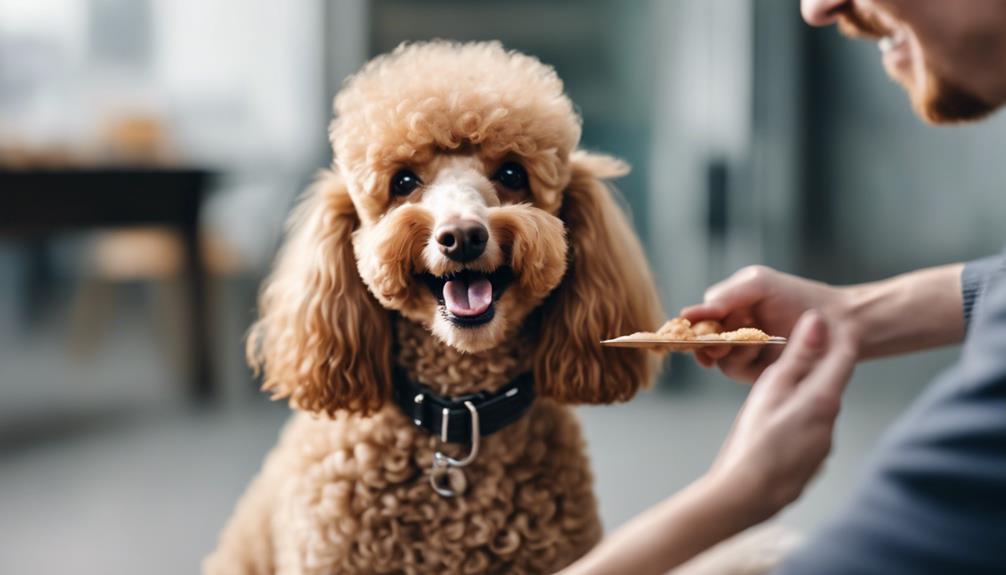When it comes to training your Poodle, remember that "you can catch more flies with honey than with vinegar." Positive reinforcement training can be the key to unlocking your Poodle's full potential and building a strong bond with them. By utilizing this method, you can create a harmonious relationship based on trust and mutual understanding. But what are the specific techniques and rewards that work best for Poodles? Stay tuned to discover effective strategies and valuable insights into positive reinforcement training for your beloved Poodle.
Key Takeaways
- Enhances bond and behavior
- Strengthens trust and learning
- Creates positive associations
- Makes learning enjoyable
Benefits of Positive Reinforcement Training
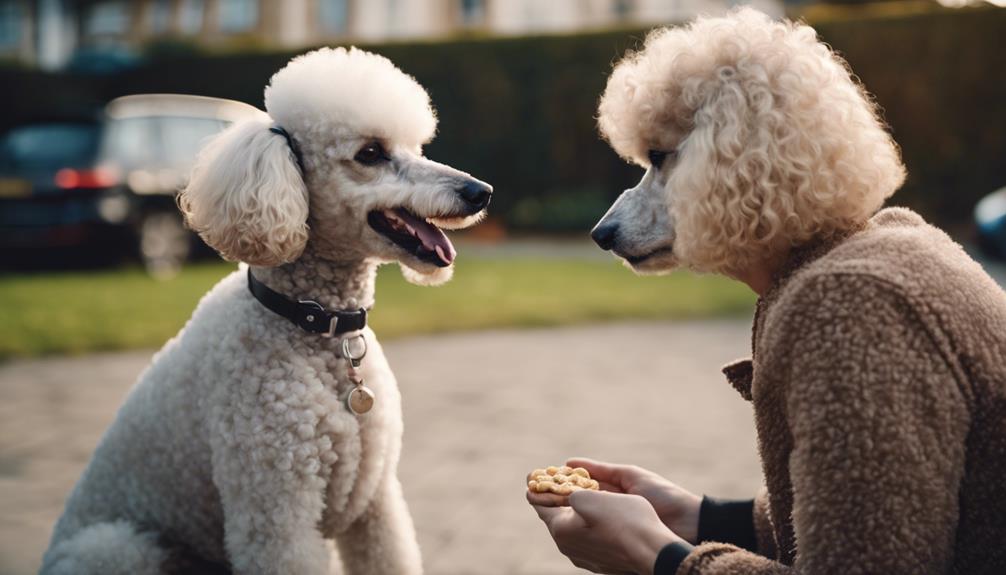
When training your Poodle with positive reinforcement, you will experience a range of benefits that enhance your bond and promote good behavior. Positive reinforcement training for your Poodle not only improves their behavior but also strengthens the trust between you and your furry companion. By rewarding good actions, you are encouraging faster learning and eliminating unwanted habits effectively. This method of training creates positive associations by focusing on acknowledging desired behaviors, making the learning process enjoyable for your Poodle.
Establishing clear communication and being consistent are crucial elements for successful positive reinforcement training. Through this approach, you are not only shaping your Poodle's behavior but also deepening your connection with them. Your Poodle will respond well to this positive training method, and you will find that they are more eager to learn and please you. Embrace this training technique to see remarkable improvements in your Poodle's behavior and strengthen the bond you share.
Effective Methods for Poodle Training
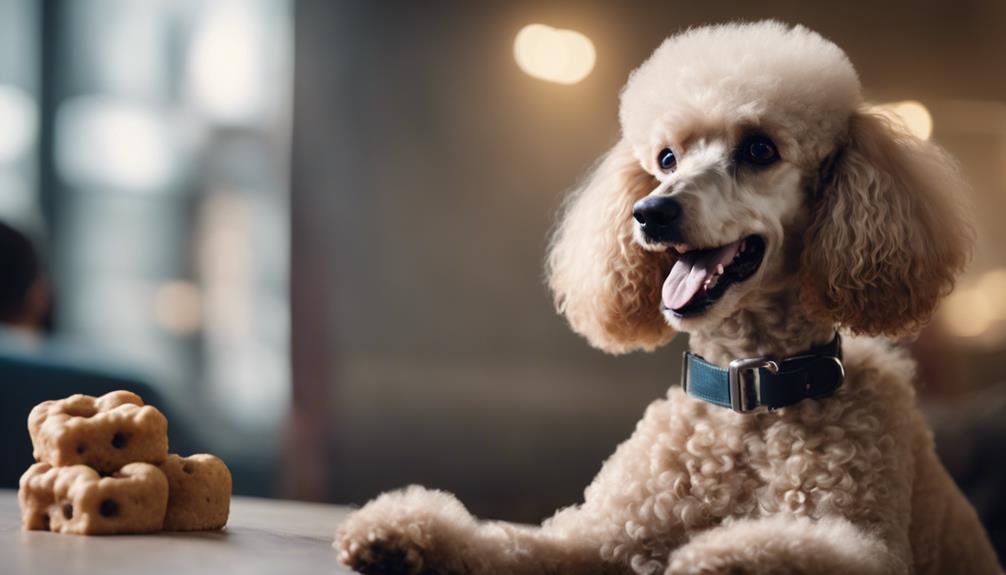
When training your Poodle, remember to use reward-based techniques to reinforce good behaviors consistently. By staying firm with your commands and rewarding positive actions promptly, you can effectively guide your Poodle's learning process. Boosting their confidence through positive reinforcement will help them understand and respond to your cues better.
Reward-Based Training Techniques
To effectively train your Poodle using reward-based techniques, prioritize immediate rewards, consistency in cues, and clear communication. Positive reinforcement training involves rewarding desired behaviors such as sitting, staying, or walking nicely on a leash with treats, praise, or playtime. By catching your Poodle in the act of good behavior, you can create positive associations with the desired actions. Remember, consistency is key in reinforcing good actions to encourage faster learning and build trust between you and your Poodle. Be patient and use clear communication to help your furry friend understand what behavior is being rewarded. With these methods, you can effectively train your Poodle and strengthen your bond through positive reinforcement.
Consistency in Commands
Maintaining consistency in your commands is a fundamental aspect of effective Poodle training to ensure clarity and avoid confusion during the learning process. Utilizing clear one-word commands creates a structured learning environment where your Poodle can easily comprehend and respond. It is essential to uphold a unified training approach by using the same commands with all family members to maintain consistency and avoid mixed signals. This approach fosters a harmonious relationship between you and your furry companion, promoting a deeper understanding and quicker learning. By establishing a routine with consistent commands, you set the groundwork for successful positive reinforcement training, paving the way for a well-trained and happy Poodle.
Importance of Consistency in Training
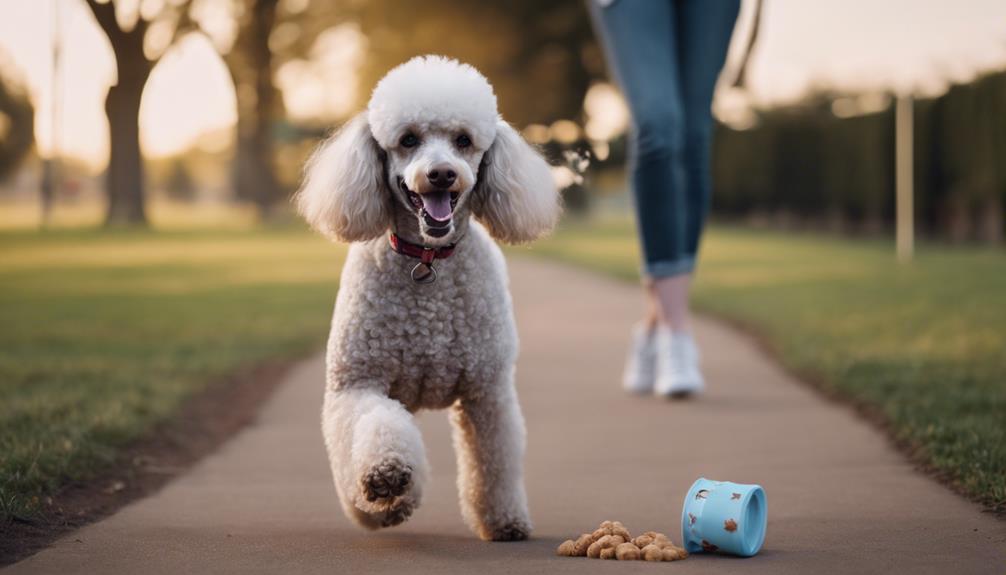
Consistency in training your Poodle is key to effectively communicating expectations and fostering a stable learning environment. By providing consistent cues and commands, you help your Poodle understand what is expected, which in turn reinforces positive behaviors. Poodles thrive on routine and respond well to consistent training methods. When you establish a predictable training schedule, it not only aids in reinforcing desired behaviors but also creates a sense of security for your furry companion.
Inconsistencies in training can lead to confusion and hinder your Poodle's progress. If the rules keep changing, your Poodle may struggle to understand what is being asked of them, causing frustration for both you and your pet. Clear and consistent communication is essential for successful training sessions. By maintaining a steady approach and setting clear expectations, you can create a harmonious learning environment that supports your Poodle's development and strengthens your bond.
Shaping Behavior With Positive Reinforcement
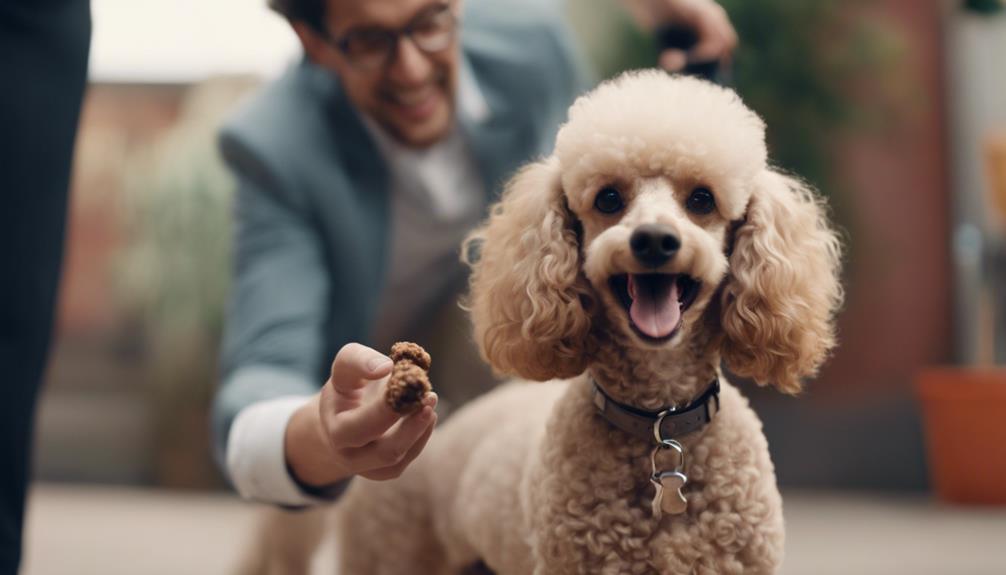
When shaping behavior with positive reinforcement, you'll be rewarding desired actions and encouraging gradual progress in your Poodle. By recognizing and reinforcing small steps towards the ultimate goal, you help your dog understand what behaviors lead to rewards. This method lays the foundation for shaping complex behaviors and fostering a strong connection with your furry companion.
Rewarding Desired Actions
To effectively shape your Poodle's behavior with positive reinforcement, focus on consistently rewarding small steps towards the desired actions. Immediate rewards for your Poodle's good behavior will help solidify the positive habits you want to instill. By catching your Poodle in the act of doing something right, you can provide instant positive reinforcement, reinforcing the behavior you desire. This approach not only aids in training but also enhances the bond between you and your furry companion. Remember, maintaining patience and using consistent cues are vital components of successful positive reinforcement training. Your efforts to reward even the smallest progress your Poodle makes will pave the way for long-lasting, positive behaviors and a stronger connection between you both.
Encouraging Gradual Progress
Encouraging your Poodle's gradual progress through positive reinforcement involves rewarding each small step towards the desired behavior. By acknowledging and reinforcing successive approximations of the behavior you aim to teach, you break down the learning process into manageable chunks. This method not only facilitates gradual progress but also ensures effective communication between you and your Poodle. Celebrating each small victory keeps your furry friend motivated and engaged in the training process. Through this approach, your Poodle learns to connect positive outcomes with specific actions, paving the way for successful learning. Remember, patience and consistency are key when shaping your Poodle's behavior with positive reinforcement. Keep up the good work, and you'll both see progress in no time!
Choosing the Right Rewards for Poodles
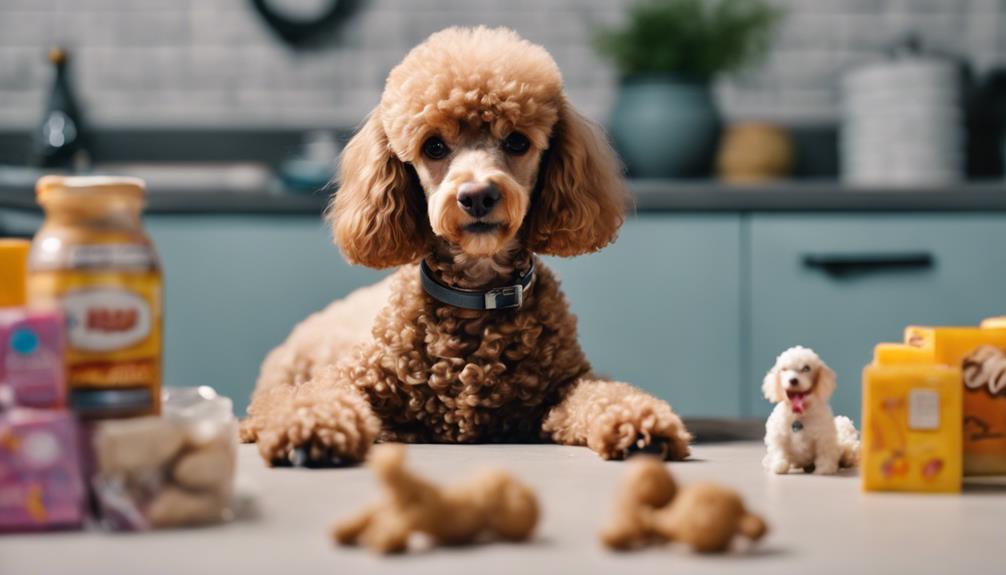
To effectively train your Poodle, it is essential to select the most suitable rewards based on their preferences and motivations. Understanding what motivates your Poodle will help you choose the most effective rewards for positive reinforcement training. Here are some tips for choosing the right rewards:
- Treats: Poodles often respond well to treats during training sessions. High-quality treats that your Poodle loves can be a great motivator.
- Praise: Poodles thrive on attention and praise from their owners. Verbal affirmations and enthusiastic praise can be powerful rewards.
- Playtime: Incorporating playtime into training sessions can make learning fun for your Poodle. Interactive play sessions can be a great reward for a job well done.
- Variety: Offering a variety of rewards keeps training engaging and prevents boredom. Mixing up treats, playtime, and praise can help maintain your Poodle's interest and motivation throughout training sessions.
Common Mistakes to Avoid in Training
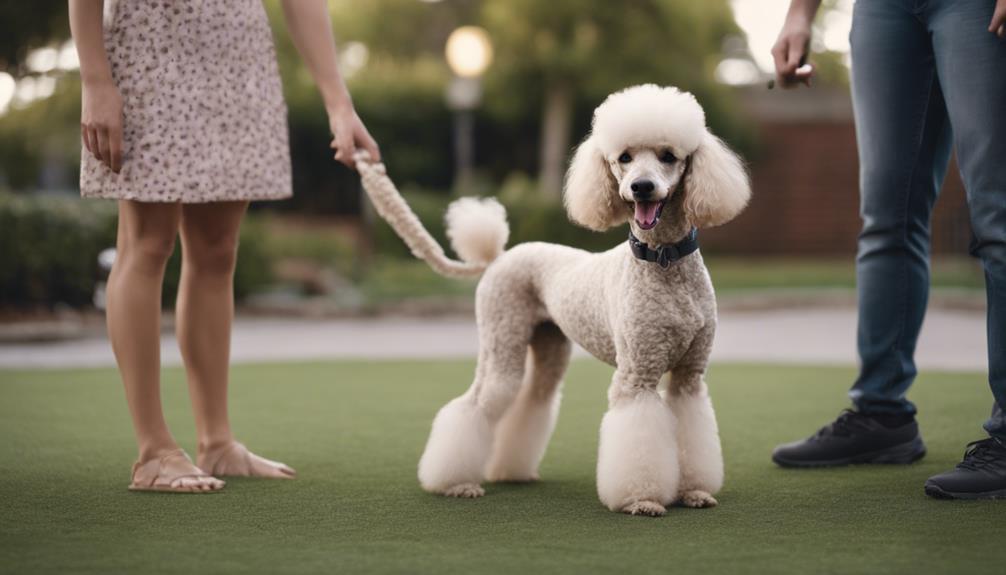
When training your Poodle, steer clear of punishment-based methods to foster a positive learning environment. Instead, focus on positive reinforcement to encourage good behavior. Avoid using inconsistent cues during training sessions as this can confuse your Poodle. Be mindful not to accidentally reward undesired behaviors, as this can reinforce negative habits. Remember, patience and consistency are key in training your Poodle effectively. It's essential to stay calm and composed, even if progress seems slow. Additionally, keep your training sessions short and engaging to prevent your Poodle from becoming overwhelmed. By following these guidelines, you can create a harmonious training experience for both you and your Poodle, leading to successful outcomes.
Advanced Training Techniques for Poodles
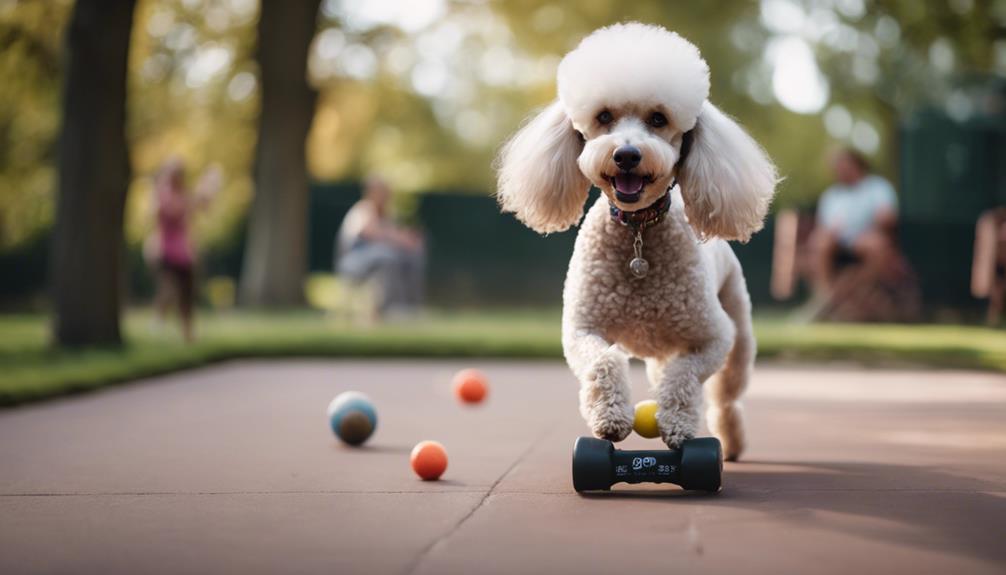
For advanced training techniques with your Poodle, consider incorporating shaping complex behaviors through incremental steps to enhance their learning experience and skills. By breaking down desired behaviors into manageable parts, you can guide your Poodle towards mastering advanced commands effectively. Here are some strategies to elevate your Poodle's training to the next level:
- Shaping Behaviors: Use shaping techniques to gradually shape and reinforce complex behaviors, helping your Poodle understand and execute intricate commands.
- Clicker Training: Incorporate a clicker to provide precise feedback and improve timing when teaching advanced commands, promoting accuracy and clarity in communication.
- Distance and Duration: Challenge your Poodle by incorporating distance and duration into commands like Stay and Come, enhancing their focus, patience, and obedience skills.
- Advanced Tricks: Teach fun and mentally stimulating tricks like rollover or play dead to engage your Poodle's cognitive abilities and physical coordination, keeping them mentally sharp and physically active.
Implementing these advanced training techniques not only enhances your Poodle's repertoire of skills but also strengthens the bond and communication between you and your furry companion.
Frequently Asked Questions
How Do I Start Positive Reinforcement Training My Dog?
To start positive reinforcement training your dog, use high-value treats and clear cues. Break commands into small steps, be patient, and stay calm. Consistency is key. Focus on rewarding desired behaviors and praise to build a strong bond.
What Is an Example of Positive Reinforcement for Dogs?
To reinforce good behavior in dogs, use treats, toys, and praise. Clicker training is effective. Engage in playtime and show affection. Incorporate training games and walks. Stick to a consistent training schedule for best results.
What Is the R+ Method of Dog Training?
The R+ method, also known as positive reinforcement training, utilizes clicker training, treat rewards, marker cues, and consistency required to shape behaviors. It focuses on encouraging positive actions rather than using punishment.
What Are the Four Types of Reinforcement Dog Training?
In dog training, there are four types of reinforcement: positive, negative, and punishments. Positive reinforcement rewards good behavior, negative reinforcement removes aversive stimuli. Both increase desired behavior. Punishments decrease unwanted behaviors by adding aversive consequences or removing rewards.
Conclusion
So, you've learned all about positive reinforcement training for your Poodle. Remember, consistency is key – unless you want your Poodle to think they can outsmart you! Keep those treats handy, and watch as your furry friend becomes a model student…or maybe just a master manipulator. Either way, enjoy the journey of training your clever little Poodle!
